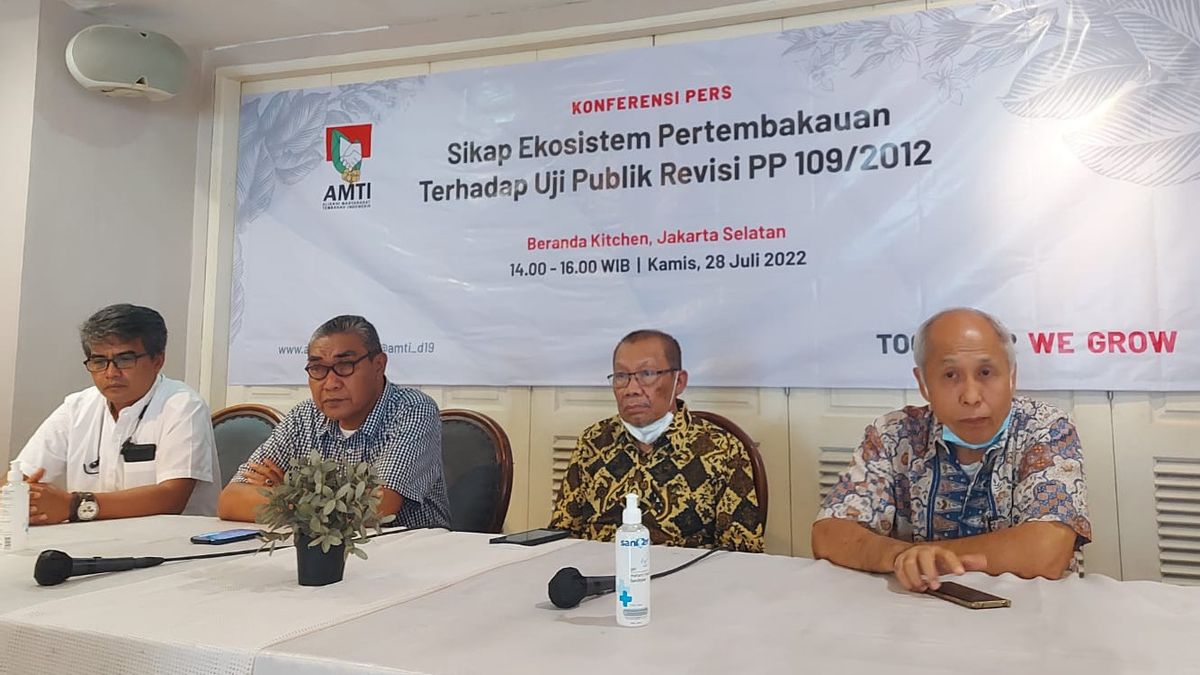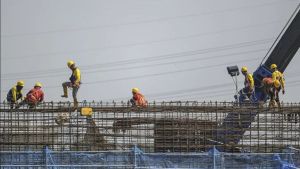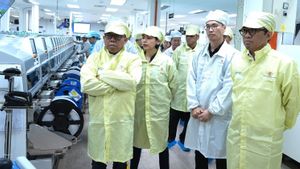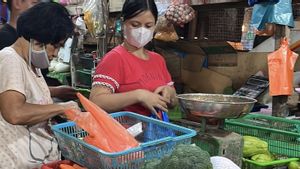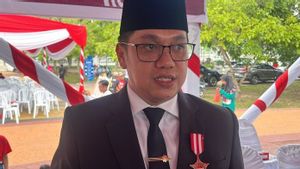JAKARTA - The entire chain of the tobacco ecosystem expressly refuses and is disappointed with the Coordinating Ministry for Human Development and Culture (Kemenko PMK) RI and the Ministry of Health regarding the process and material of the Revised Public Test of PP No. 109 of 2012 concerning the Safety of Materials Containing Addictive Substances in the Form of Tobacco Products for Health (PP 109/2012).
On Wednesday, 27 July 2022, not all representatives of the chain of tobacco ecosystems were invited by the Coordinating Ministry for Human Development and Culture to attend the Public Test of Amendments to PP 109/2012. On this occasion suddenly, the Deputy Minister of Health explained a number of points that would be included in the revision of PP 109/2012.
Budidoyo, Chairman of the Tobacco Society Alliance (AMTI) regretted that the tobacco ecosystem stakeholders who were invited suddenly did not accept the same treatment even though not all of them resided in Jakarta.
Stakeholders of the tobacco ecosystem did not receive draft rules for changes or information on what material points would be revised beforehand. It is different with other groups that support the revision of PP 109/2012, they can explain the articles and inputs eloquently,” said Budiyono, in the Press Conference of Tobacco Ecosystem Attitudes to the Public Test of Revision of PP 109/2012, Thursday, July 28.
Seeing these developments, the tobacco ecosystem is very disappointed. Moreover, the fact that official government data shows that the prevalence of child smoking, which is the justification for the revision, has fallen.
"From the start, we have firmly rejected the revision of PP 109/2012 because there is no justification for revising PP 109 because the argument that the prevalence of smoking in children is still high is not true. Official BPS data shows that the percentage of children aged 10-18 years who smoke is 9 .65 percent in 2018. The figure then decreased to 3.87 percent the year after. In 2020, the percentage of children aged 10-18 years who smoked again fell to 3.81 percent, "said Budi.
Budidoyo also emphasized that the submission and proposed revision of PP 109/2012 was legally flawed. Followed by a public trial that was not in accordance with the constitution and identified interventions by anti-tobacco groups that had previously received the revised draft. The public test conducted does not prioritize the principles of openness, fairness and independence.
"The process is not in accordance with regulations and legislation, but the group of proponents insists. We were not informed of how and what the details of the draft revision of PP 109/2012 were. It was a matter of substance. In the public examination, all types of diseases were charged, caused by tobacco. The data used is also different, selectively. This process is not neutral. It's not fair, "said Budidoyo.
Soeseno, Chairman of the Indonesian Tobacco Farmers Association (APTI) also expressed his disappointment with the government for ignoring the fate of the grassroots. Soeseno emphasized that all farmers from the beginning rejected the revision of PP 109/2012 because it would affect the livelihoods of 2.5 million tobacco farmers.
Farmers as a marginal group that has the most difficulty getting access to information related to the revision of this regulation, are forced to agree to a policy change that clearly contains a total prohibition and adds to the burden on the tobacco sector.
"Revised PP 109/2012 intends to kill 2.5 million tobacco farmers and 1.5 million clove farmers whose livelihoods depend on the tobacco ecosystem. Farmers have the right to protection, to be given the opportunity to live a decent and prosperous life. submitted is not valid, but a hoax," said Soeseno.
"The public test that was carried out was not appropriate, the term was that the public test was carried out only to seek public legitimacy. We do not understand the way the Coordinating Ministry for Human Development and Culture has thought from the start. refused because the public test forum was full of hoaxes and hoaxes," added Soeseno.
By not giving tobacco farmers access to the widest possible access and fully understanding the revised plan for PP 109/2012, it clearly shows that the government does not uphold the participatory and accommodative principles.
"The Coordinating Ministry for Human Development and Culture ignores farmers. The ministry, which should be neutral, sided with foreign pressure and intervention that wants to eliminate Indonesian tobacco. The Coordinating Ministry for Human Development and Culture sided with the pressure of various anti-tobacco groups full of foreign interests that aim to destroy the sustainability of Indonesia's tobacco sector," said Soeseno.
It should be noted that there are four main points of the Revised PP 109/2012, including 90 percent of prohibitions on promotions, restrictions on production, regulation of commercial activities, and consumer activities, while ignoring the rights of communities within the tobacco ecosystem itself.
The insistence of anti-tobacco groups is certainly contrary to the positive efforts to be achieved by the Government of Indonesia through the National Economic Recovery Plan after the COVID-19 pandemic.
"During the pandemic, we clove farmers have tried to rise up, restore our independence and purchasing power. Meanwhile, the pressure and pressure of these groups to take advantage of opportunities and secretly propose the process of changing PP 109/2012 unconstitutionally. /2012 is not the first time they have done it. We in the upstream, the farmers will be the worst victims of the proposed revision of this regulation, "added I Ketut Budhyman Mudhara, Secretary General of the Indonesian Clove Farmers Association (APCI).
The Arrogance of the Related MinistriesThe openness and lack of involvement of the tobacco ecosystem in the draft revision and public review of PP 109/2012 illustrates the arrogance of the relevant ministries. Procedurally and in substance, the efforts to revise the regulation are not transparent and unbalanced.
"The stigma that is built against tobacco is so cruel, irrational. Starting from health issues, the environment to state problems, all are charged to tobacco. The revision process of PP 109/2012 has violated public information disclosure. We are the tobacco ecosystem that is affected," said Hananto Wibisono, AMTI Secretary General.
Anti-tobacco groups, said Hananto, always encourage the realization of excessive policies, and encourage regulations that prohibit all activities in the tobacco sector. Throughout the discourse on the revision of this regulation, he continued, the tobacco ecosystem was never given the space to convey reality.
"The tobacco ecosystem has complied with all the guidelines contained in PP 109/2012. Tobacco and tobacco products are legal goods and legal activities. We ask the government to protect the tobacco ecosystem which has contributed to the country," added Hananto.
The English, Chinese, Japanese, Arabic, and French versions are automatically generated by the AI. So there may still be inaccuracies in translating, please always see Indonesian as our main language. (system supported by DigitalSiber.id)
